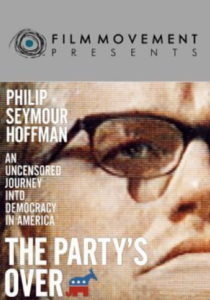
When I received emails yesterday about the shocking and untimely death of gifted actor Philip Seymour Hoffman, I thought immediately about all the sensitive and brilliant people who have been taken from us long before their time. It’s easy to say that this death is another one of the meaningless deaths in a long list, but I just can’t look at it that way. Philip Seymour Hoffman’s talent and life on screen had meaning for me. It will endure.
 I had occasion to interview Hoffman sometime around the year 2001 concerning a movie called “Last Party 2000.” It was a political documentary in which Hoffman lent his voice talents as narrator. His droll, acerbic, intellectual approach to most everything he did came across nicely in what turned out to be a very personal film experience for him. And as witty and dismissive as he sometimes appears on screen, he was humble and giving in the interview. We spoke briefly about his mother and her political background and how that shaped his views. He was open, warm, and by all means intelligent.
I had occasion to interview Hoffman sometime around the year 2001 concerning a movie called “Last Party 2000.” It was a political documentary in which Hoffman lent his voice talents as narrator. His droll, acerbic, intellectual approach to most everything he did came across nicely in what turned out to be a very personal film experience for him. And as witty and dismissive as he sometimes appears on screen, he was humble and giving in the interview. We spoke briefly about his mother and her political background and how that shaped his views. He was open, warm, and by all means intelligent.
 On screen Hoffman conveyed intellect and control, even when he played weak characters like the needy Scotty J. in Paul Thomas Anderson’s brilliant “Boogie Nights.” In that film, Hoffman played a character with a man crush on porn star Dirk Diggler, played by Mark Wahlberg. Certainly, Wahlberg’s impressive performance was enhanced by Hoffman’s ability to melt into character and support like few other actors of his generation. And that performance demonstrated Hoffman’s commitment to character, even if that meant that the character he played looked awful and even disreputable. Hoffman was a budding movie star but also one that had a unique commitment to craft.
On screen Hoffman conveyed intellect and control, even when he played weak characters like the needy Scotty J. in Paul Thomas Anderson’s brilliant “Boogie Nights.” In that film, Hoffman played a character with a man crush on porn star Dirk Diggler, played by Mark Wahlberg. Certainly, Wahlberg’s impressive performance was enhanced by Hoffman’s ability to melt into character and support like few other actors of his generation. And that performance demonstrated Hoffman’s commitment to character, even if that meant that the character he played looked awful and even disreputable. Hoffman was a budding movie star but also one that had a unique commitment to craft.
His partnership with Paul Thomas Anderson (or PT Anderson as he is also credited) continued through a number of films including one of my favorites 1999’s “Magnolia.” As the nurse for a dying man, played amazingly well by Jason Robards, Hoffman was able to convey sensitivity and give weight to a smallish supporting role that benefitted those around him. Tom Cruise was nominated for the Oscar for that one. In his scenes with Hoffman, the ridiculous statement by Cruise’s character in which he repeatedly stated that he would “dropkick” the dogs if they got near him seemed natural and less comical and more meaningful given Hoffman’s reaction.

While Hoffman won the best actor award for his portrayal of Truman Capote in the 2005 film “Capote,” his turn as cult leader Lancastor Dodd in “The Master” is the kind of performance that budding actors should study. Opposite Joaquin Phoenix, Hoffman plays Dodd like some kind of mystical genius obsessed with control of others, but at every turn subtly incapable of controlling his own emotions. While Phoenix plays a character who cannot outwardly control his emotions, Hoffman conveys someone simmering, who internally is always losing it. It is a masterful turn.
But Hoffman’s filmography is littered with amazing performances in truly special films. Just in 2007, he either starred in or had significant supporting parts in three excellent films, “The Savages, “Before the Devil Knows You’re Dead” (a personal favorite), and “Charlie Wilson’s War.” The next year, he gave us a layered in complex performance in an incredibly difficult movie called “Synecdoche, New York,” and his work opposite Meryl Streep in “Doubt” was outstanding.
A meaningless waste? I hope not. I hope that we can celebrate the life of an actor and treat his death as a potential teachable moment. Let’s not forget the seedy details that took Hoffman from us. According to some of the reports, he died in a friend’s apartment with a needle in his arm.
There is a scene in Curtis Hanson’s 2000 film “Wonder Boys” in which Prof. Grady Tripp (played well by Michael Douglas) explains how drugs and being high helped him achieve early success. Tripp proudly proclaims that not only did he write his award-winning novel while under the influence but he accepted a major award for the work while high. What is telling about that scene isn’t that drugs may have had a creative influence on the character but how foolish and immature this statement is when articulated out in the open with everyone to hear and consider. When held up to the scrutiny of public view and analysis, the flaw in such an argument becomes readily apparent.
Let’s talk about Hoffman’s death and let’s repeat the details. And, at the same time, celebrate the details of his life as well. Philip Seymour Hoffman’s death and life are both meaningful and should be remembered. A creative one is no more, but a creative life continues through the power of cinema.

